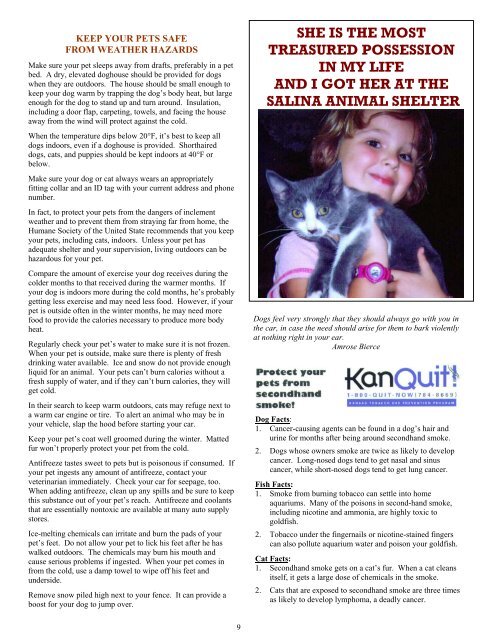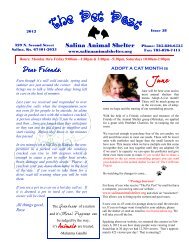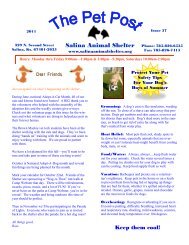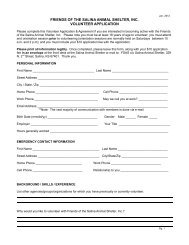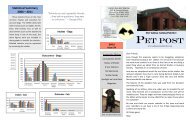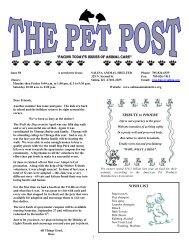Pet Post Issue 53 - Salina Animal Shelter
Pet Post Issue 53 - Salina Animal Shelter
Pet Post Issue 53 - Salina Animal Shelter
You also want an ePaper? Increase the reach of your titles
YUMPU automatically turns print PDFs into web optimized ePapers that Google loves.
KEEP YOUR PETS SAFE<br />
FROM WEATHER HAZARDS<br />
Make sure your pet sleeps away from drafts, preferably in a pet<br />
bed. A dry, elevated doghouse should be provided for dogs<br />
when they are outdoors. The house should be small enough to<br />
keep your dog warm by trapping the dog’s body heat, but large<br />
enough for the dog to stand up and turn around. Insulation,<br />
including a door flap, carpeting, towels, and facing the house<br />
away from the wind will protect against the cold.<br />
When the temperature dips below 20°F, it’s best to keep all<br />
dogs indoors, even if a doghouse is provided. Shorthaired<br />
dogs, cats, and puppies should be kept indoors at 40°F or<br />
below.<br />
Make sure your dog or cat always wears an appropriately<br />
fitting collar and an ID tag with your current address and phone<br />
number.<br />
In fact, to protect your pets from the dangers of inclement<br />
weather and to prevent them from straying far from home, the<br />
Humane Society of the United State recommends that you keep<br />
your pets, including cats, indoors. Unless your pet has<br />
adequate shelter and your supervision, living outdoors can be<br />
hazardous for your pet.<br />
Compare the amount of exercise your dog receives during the<br />
colder months to that received during the warmer months. If<br />
your dog is indoors more during the cold months, he’s probably<br />
getting less exercise and may need less food. However, if your<br />
pet is outside often in the winter months, he may need more<br />
food to provide the calories necessary to produce more body<br />
heat.<br />
Regularly check your pet’s water to make sure it is not frozen.<br />
When your pet is outside, make sure there is plenty of fresh<br />
drinking water available. Ice and snow do not provide enough<br />
liquid for an animal. Your pets can’t burn calories without a<br />
fresh supply of water, and if they can’t burn calories, they will<br />
get cold.<br />
In their search to keep warm outdoors, cats may refuge next to<br />
a warm car engine or tire. To alert an animal who may be in<br />
your vehicle, slap the hood before starting your car.<br />
Keep your pet’s coat well groomed during the winter. Matted<br />
fur won’t properly protect your pet from the cold.<br />
Antifreeze tastes sweet to pets but is poisonous if consumed. If<br />
your pet ingests any amount of antifreeze, contact your<br />
veterinarian immediately. Check your car for seepage, too.<br />
When adding antifreeze, clean up any spills and be sure to keep<br />
this substance out of your pet’s reach. Antifreeze and coolants<br />
that are essentially nontoxic are available at many auto supply<br />
stores.<br />
Ice-melting chemicals can irritate and burn the pads of your<br />
pet’s feet. Do not allow your pet to lick his feet after he has<br />
walked outdoors. The chemicals may burn his mouth and<br />
cause serious problems if ingested. When your pet comes in<br />
from the cold, use a damp towel to wipe off his feet and<br />
underside.<br />
Remove snow piled high next to your fence. It can provide a<br />
boost for your dog to jump over.<br />
SHE IS THE MOST<br />
TREASURED POSSESSION<br />
IN MY LIFE<br />
AND I GOT HER AT THE<br />
SALINA ANIMAL SHELTER<br />
Dogs feel very strongly that they should always go with you in<br />
the car, in case the need should arise for them to bark violently<br />
at nothing right in your ear.<br />
Amrose Bierce<br />
Dog Facts:<br />
1. Cancer-causing agents can be found in a dog’s hair and<br />
urine for months after being around secondhand smoke.<br />
2. Dogs whose owners smoke are twice as likely to develop<br />
cancer. Long-nosed dogs tend to get nasal and sinus<br />
cancer, while short-nosed dogs tend to get lung cancer.<br />
Fish Facts:<br />
1. Smoke from burning tobacco can settle into home<br />
aquariums. Many of the poisons in second-hand smoke,<br />
including nicotine and ammonia, are highly toxic to<br />
goldfish.<br />
2. Tobacco under the fingernails or nicotine-stained fingers<br />
can also pollute aquarium water and poison your goldfish.<br />
Cat Facts:<br />
1. Secondhand smoke gets on a cat’s fur. When a cat cleans<br />
itself, it gets a large dose of chemicals in the smoke.<br />
2. Cats that are exposed to secondhand smoke are three times<br />
as likely to develop lymphoma, a deadly cancer.<br />
9


